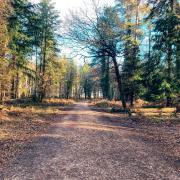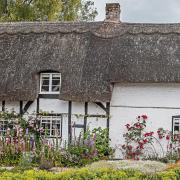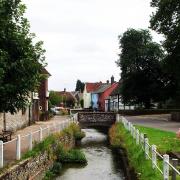With uncertainty surrounding the UK’s decision to leave the EU, Hampshire’s rural communities are firmly focused on how to introduce new blood to help sustain our countryside industries. Claire Pitcher talks to those who are feeling positive about the future
As this year’s harvest comes to its conclusion so many of the fields around the county are stacked high with straw bales. Just looking out of my window I can see them dotted about the landscape, and next door the barn doors housing the farm’s combine harvester, tractors and trailers have been closed up and the grain dryer put to use for the final time of the season.
It’s got me thinking not just about what Brexit might mean for my farming neighbours, but also about how they might need to make changes, diversify and bring in young blood to the industry over the coming years. Who better to pose such questions to than Hampshire’s Campaign to Protect Rural England (CPRE) group?
A recent report by the CPRE looks into a new model of farming focusing on diversity. It’s fair to say that innovation will be key when it comes to food and farming issues, with the report pointing out that ‘post-Brexit there is an opportunity for farming to become more diverse and environmentally resilient.’
According to Christopher Napier OBE, Chairman of CPRE Hampshire’s Planning and Policy Group, young people play a pivotal role too.
“It’s vital that we encourage young people to work in the industry. With 34,000 fewer farms in the UK than there were a decade ago, we suggest that more land should be made available to new groups of farmers, growers and communities through a package of measures.”
This means there needs to be access to a range of farm sizes and types that produce different foods for local people and varied, thriving landscapes.
“With fewer small to medium-sized holdings, it is hard for those who are young or new to farming to farm in their own right, or for others to move up the ladder as their experience and business grows,” points out Christopher.
He also suggests some areas of the county could benefit from the promotion of new, low-impact and sustainable farms: “It would offer more variety to the landscape,” he says, “as well as local jobs and products, opportunities for young or skilled older workers to enter farming, and the involvement of communities.”
Along with many of Hampshire’s groups, such as the Young Farmers and Hampshire Fare, Christopher astutely sums up how many feel.
“We’re united in a love for our county’s landscapes and rural communities, and stand up for the countryside so it can continue to sustain, enchant and inspire future generations.”
Recent graduate of Sparsholt College Nick Wills now works on the Royal Sandringham Estate. He studied a subject that plays a vital role in the countryside not just in Hampshire, but throughout the UK.
“I took Wildlife Management and Gamekeeping at college. They have such a good reputation, plus I was really interested in gamekeeping as I am often involved with my local shoot at home.
“Managing the countryside and estates is important so that habitats can be managed for everyone to enjoy. There is a necessity for people working in the countryside to be well trained so they can operate safely and give maximum benefit to the environment they work in.”
During his Diploma, Nick enjoyed meeting many like-minded people. “Plus I enjoyed putting knowledge into practice when I went on work experience. One of the most memorable parts of my time there were trips to Scotland and Teasdale. There was plenty of practical work to do at the Mar Lodge Estate and of course, working alongside the Estate’s gamekeepers in their own environment was invaluable.”
As trainee Gamekeeper at The Royal Sandringham Estate in Norfolk, Nick is putting his knowledge to good use.
“It really is an amazing opportunity for me to start my career. It is a two-year training programme that’s run by the Estate.”
It’s the young, enthusiastic graduates from Sparsholt who will be leading the way in our rural communities in the coming years and as Nick rightly points out, “Farming and management methods are changing all the time. In gamekeeping for instance, industrial practices are now more commonly used, where large shoots buy in their birds rather than raising them themselves. Conservation techniques can still be effective also.” Putting the theory he learnt in Hampshire into practice in Norfolk with an experienced keeper is progressing Nick’s practical skills, and he’s hoping to continue working his way up in the industry as time goes on.
So what would he say to any young people who are considering working in the countryside?
“If you enjoy working outdoors then there is a lot to be gained from all the careers that are available, and studying for them is possible at great colleges like Sparsholt.”
Meanwhile, at Beechcroft Farm…Rachel Waldron has been running her family’s farm just outside Winchester for the last nine years.
“I don’t remember making a conscious decision to work in farming. I’d always helped out on the farm and worked on local farms during school holidays and after school. Farming is just something that felt right to do.”
Beechcroft is a 200-acre livestock farm.
“My great-grandparents were tenants of the farm. They were presented with the opportunity to buy it and it has been in the family ever since. My grandparents ran a dairy herd and arable operations including producing thatching straw. Due to illness the dairy side of the business ceased. It was at that point my parents took over the farm, introducing a beef suckler herd and sheep flock as well as continuing the arable operation.”
In 2009, Rachel’s parents, Joy and Nick, ceased arable farming and converted the old dairy into a self-catering holiday cottage. It was then Rachel returned to work: “I harassed my poor parents into a few harebrained schemes, one of which was to buy a few pigs and start selling our meat direct to the public through Farmers’ Markets and a small farm shop. After a few small changes, this is essentially where we are today, two flocks of sheep, a suckler cow herd, a herd of outdoor pigs, holiday cottage and a farm shop.”
Rachel also went to Sparsholt, completing a three-year diploma in Agriculture.
“I learnt a huge amount about the practical side of farming, as well as the theory behind the methods. I then completed a BSc (Hons) in Agriculture at the Royal Agricultural College in Cirencester.”
It’s not so much the farming methods that have changed at Beechcroft over the years, it’s what they offer, as Rachel explains: “Direct selling to the public is probably the biggest change in our recent history, as well as the conversion of the dairy into a self-catering holiday cottage.”
As for what the future holds?
“Farming is a complex business and there are so many factors that affect it. Bovine TB is a big challenge for the cattle industry and has such devastating effects on infected farms. In terms of future financial challenges, Brexit is top of the agenda. It’s difficult to plan ahead when there is such a huge question on what support the farming industry will receive, as well as trade agreements for UK agricultural produce. However things turn out, I’m so fortunate to work in such an amazing office: the Hampshire countryside! I love working outdoors with animals and am proud to be carrying on my family’s tradition.”
Career path
If you love working in the outdoors and would like to find out more about what an agricultural career can involve, discover what courses are available at Sparsholt at www.sparsholt.ac.uk. For more information on CPRE and their involvement with the Hampshire countryside visit www.cprehampshire.org.uk.
More…
• Why making the most of our own outdoor space is good for wildlife - With gardens covering 270,000 hectares of the UK, it is vital that we make the most of our outdoor spaces to attract wildlife says Jenny Simpson from Hampshire and Isle of Wight’s Wildlife Trust



























